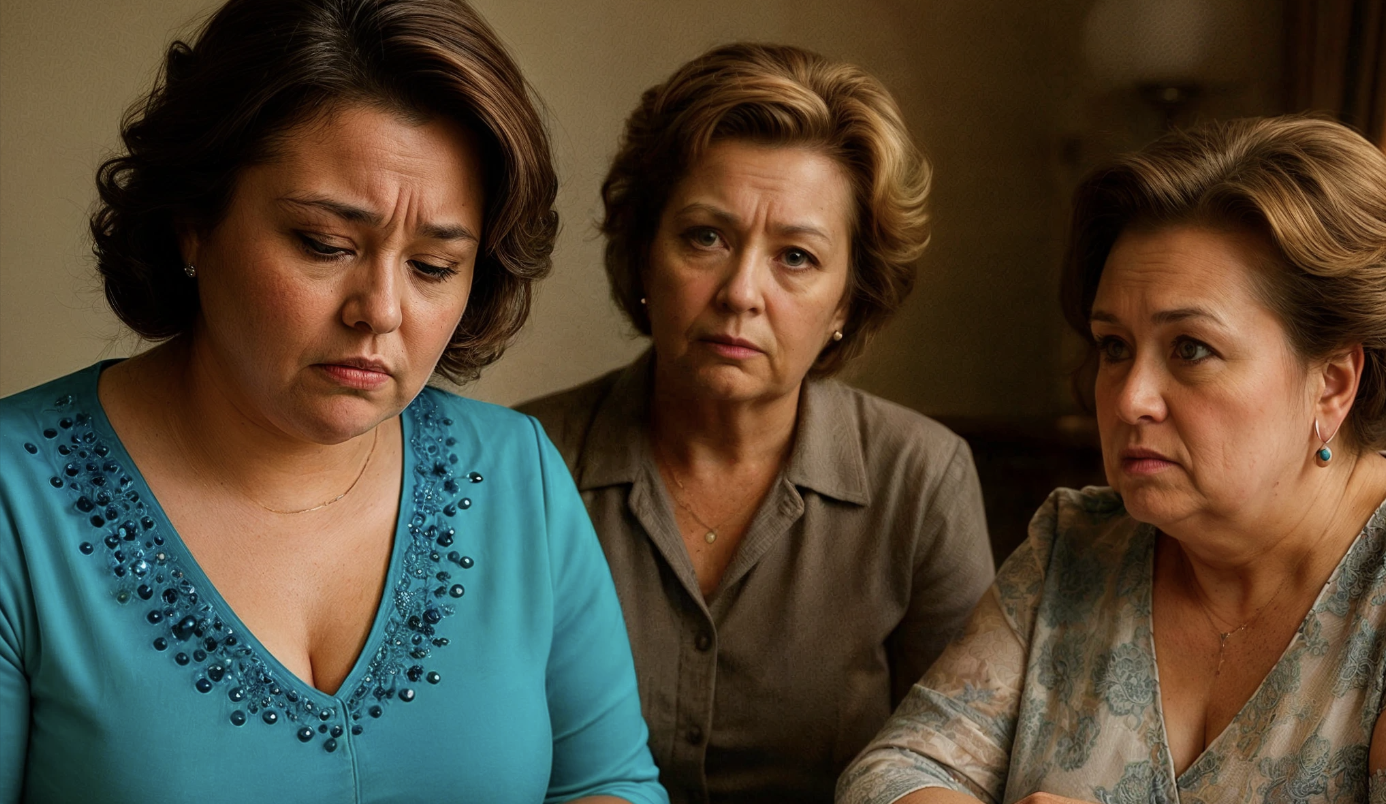They were expecting borscht or cutlets. She dropped a stack of documents onto the table so loudly that Aunt Elina’s fork slipped from her hand. In that moment, the familiar family script stopped existing.
Irina stood by the table, straight as a string. She’d been preparing for this moment all evening—buttoned her blouse all the way up, pulled her hair into a tight bun, even put on lipstick. Not bright—muted pink she’d bought on sale. But now it felt like her lips were blazing like a neon sign.
“What’s this?” Elina Georgievna adjusted her glasses. The fork still lay on the floor, and no one hurried to pick it up.
“A purchase agreement,” Irina answered, and her own voice sounded strange to her. “I bought a house.”
The family sat around the table, as usual, according to their unspoken hierarchy: at the head sat Uncle Grisha, Aunt Elina’s husband. On his right—Elina herself, on his left—Irina’s mother, Tatyana. Next to her, Irina’s father, Sergey Petrovich, perpetually silent, a newspaper in his hands. Irina sat at the far end of the table, where she’d always sat since childhood. The place for quiet children and unmarried daughters.
“What house?” Uncle Grisha put down his fork.
“A house on Zelyonaya Street, 12,” Irina sat down and opened the folder. “Two stories, with a garden. In the same neighborhood where you live.”
Silence fell. Then Elina laughed:
“Girl, what did you do, get yourself into debt? With your salary…”
“No debt,” Irina put a bank statement on the table. “I bought the house. In cash.”
For thirty-two years, Irina had been “quiet little Irochka” to her family. The younger daughter in a family where the older sister, Natasha, had long since married, had three children, and arrived at every holiday with her businessman husband in an expensive car. “Natasha got lucky,” her mother liked to say. “And you, Irochka, are too picky. At your age you don’t get to choose.”
Irina worked as a translator in a small company, rented a room in a three-room apartment where two other girls lived with her. At family dinners, Irina usually kept quiet, listening to her parents, aunt, and uncle discuss prices, politics, and useless youth.
“Our poor little Ira,” Aunt Elina would sigh. “So quiet, so modest. And always alone, always alone. You should really meet someone serious.”
“I introduced her to Vera from accounting’s son,” her mother would reply. “She wouldn’t even go on a second date!”
“He spent the whole evening talking about his car,” Irina tried to defend herself.
“About his car!” her mother would throw up her hands. “You should be glad the man has a car at all! Otherwise you’ll end up like Aunt Lyuba, cooing alone into old age!”
Irina stared into her plate and stayed silent. What was the point of explaining? To them she was defective merchandise: thirty-two and still not married.
But Irina had a secret. Four years ago she had gotten a remote job at an international company. She didn’t quit her main job—she just started translating technical documents in the evenings. The pay was good, in dollars. She spent her first paycheck on a new laptop. After that, she started saving.
When the international company offered her a permanent, full-time contract, Irina quit her old job. She told her parents she’d found something closer to home, with the same salary. They shrugged—what difference did it make where she worked if the pay was miserable anyway?
But the salary was anything but miserable. In two years Irina managed to save enough for a down payment on a small apartment. And then a miracle happened—she met Artyom. He worked as a financial consultant, helping people invest. Irina took a risk and invested part of her savings on his advice. Her investments doubled.
“You bought a house?” her mother put down her napkin. “With what money?”
“With my own,” Irina replied calmly.
“And where would you get that kind of money?” For the first time that evening there was interest in her father’s voice.
“I work for an international company. I translate technical documentation. It’s been four years now.”
“And what, they pay you millions?” Aunt Elina smirked skeptically.
“Not millions. But enough. And I invested. And my investments grew.”
“You? Invested?” Uncle Grisha laughed. “You’re afraid to even count your change at the cash register!”
Irina felt the heat rise in her cheeks. Before, she would have stayed silent. Lowered her eyes, pretended not to notice the mockery. But today was a special day.
“I have an advisor,” she said. “He helps me with investments. And not only with those.”
“An advisor?” her mother repeated. “What sort of advisor?”
“Artyom. My fiancé.”
Silence settled over the table, so deep they could hear the old clock on the wall ticking.
“Fiancé?” her mother finally forced out. “You have a fiancé?!”
“Yes. We met two years ago. He’s a financial consultant.”
“And where is this fiancé of yours now?” Aunt Elina wanted to know.
“On a business trip. He’ll be back in a week.”
“And when is the wedding?” her mother still couldn’t believe it.
“Next month. We’ve already filed the application.”
Irina opened the folder and took out a second document—an invitation to the wedding, beautifully designed, with gold embossing.
“That, in fact, is why I brought you all together. To tell you two pieces of news: I bought a house and I’m getting married.”
She met Artyom in an English course for finance professionals. Irina taught those weekend courses for extra income. Artyom turned out to be the most capable student. After class they often discussed the subtleties of translating financial terms, then they started meeting at cafés, and then…
Then for the first time in her life Irina felt that she was valued not for her looks, not for her obedience, not for her cooking skills, but for her mind. For her professionalism. For who she was.
Artyom was five years younger than her, tall, with cheerful blue eyes and an open smile. When she told him about her savings, he didn’t laugh, didn’t say “women and finance don’t mix,” the way her father always did. Instead he nodded seriously and suggested several investment options.
“You’re smart and disciplined,” he told her. “With qualities like that you can achieve a lot.”
No one had ever called Irina smart. Quiet—yes. Modest—as much as you like. A “good girl”—constantly. But smart?
Six months later Artyom suggested they move in together. Irina was renting a room, and he assumed she just didn’t have the money for her own place.
“I have enough for a down payment on an apartment,” she said. “I just can’t bring myself to take the leap.”
“Why not?”
“I’m afraid I won’t be able to handle the mortgage. Something might happen—I could lose my job or get sick…”
Artyom thought for a while.
“What if not an apartment? What if a house?”
“A house?” Irina laughed. “You’re joking, right? That’s millions!”
“There’s one option,” he said slowly. “One of my clients has a house in the suburbs. Old, but solid. She’s planning to move in with her daughter in another city. I know she’s willing to sell it significantly below market value. She wants the house to go to good people.”
They went to see the house the very next day. Two stories, spacious, with a garden, apple trees, and an old gazebo. A bit neglected, needing repairs, but Irina liked it. Not a concrete box like new-build apartments, but a house with history, with character.
“How much?” Irina asked the owner, an elderly woman with kind eyes.
The amount she named was half the market price. Still a huge sum, but… If she combined her savings and the profit from her investments…
“I’ll take it,” Irina said, and for the first time in her life she didn’t feel afraid of making a big decision.
“And where is this house?” her father asked, studying the documents.
“On Zelyonaya Street. Three blocks from you,” Irina nodded toward her aunt and uncle.
“That’s where all the rich folks’ cottages are!” Aunt Elina exclaimed. “A house like that costs as much as a plane!”
“I got lucky. I bought it well below market value.”
“And when are you moving?” her mother asked.
“I already moved. Three days ago.”
“Three days ago?” Her mother threw up her hands. “Why didn’t you say anything? We would have helped!”
“Artyom helped me,” Irina replied gently. “I don’t have that many things.”
That was true. Her whole life fit into two suitcases and a few boxes of books. A laptop, clothes, some dishes—this was the entire property of “quiet little Irochka.”
“And you’re going to live in that huge house with Artyom?” her mother shook her head. “Before the wedding?”
“Yes, Mom. The wedding is only three weeks away.”
“But that’s… improper!”
“I’m thirty-two, Mom.”
“All the more reason! What will people think?”
“What people?” Irina shrugged. “The neighbors? They don’t even know me.”
“Don’t talk back to your mother!” her father slammed his palm on the table. “She’s worried about you.”
Irina sighed. She knew this would be hard. That they wouldn’t believe, wouldn’t understand, wouldn’t accept. For them she had always been “poor quiet Irochka,” who lived on pennies and couldn’t find a husband.
The image they’d created was far too convenient—it allowed them to feel more successful, more important. “Poor little Ira” was the mirror in which the rest of the family saw their own well-being.
“I didn’t invite you to argue,” she said calmly. “I invited you to share my happiness and invite you to the wedding.”
“What kind of wedding is it if no one’s even seen the groom?” Uncle Grisha snorted.
“You’ll see him in a week, when he comes back from his business trip. I’ll host a dinner. In my house.”
In my house. The words sounded so strange. She had never had a home of her own before. Only a rented room where you couldn’t even hammer a nail into the wall without the landlord’s permission.
“So you just went and bought a house like that?” Aunt Elina still wouldn’t let it go. “Without advice? Without consulting your family?”
“Yes, Auntie. I just went and bought it.”
“What if they cheated you? What if the wiring is rotten or the foundation is cracked?”
“I had the house inspected before the purchase. I hired a professional.”
“You? Hired a professional?” Aunt Elina laughed. “You’re afraid to even call a taxi!”
And then Irina understood: they would never change their opinion of her. To them she would always be “quiet little Irochka,” even if she bought a skyscraper and married a billionaire.
“I’ve changed, Auntie,” she said, getting up from the table. “We all change.”
Irina went home by taxi. She hadn’t bought a car yet—she planned to do that after the wedding.
The house greeted her with coolness and silence. Old, but solid, with wooden floors that creaked under her feet, high ceilings, and spacious rooms. It smelled of wood, dust, and apples.
Irina turned on the light and walked into the kitchen. It was huge, with a wide table in the middle. She imagined cooking breakfast for Artyom here. How they would spend evenings together in the living room, how they would arrange the house, make it their own.
Her phone buzzed—a message from her mother:
“Sorry about today. We just worry about you. We really want to meet your fiancé.”
Irina smiled. Of course they worried. For them everything had happened too fast. Just yesterday “poor quiet Irochka” was renting a room and working for pennies. And today she had her own house and a fiancé.
She typed her reply:
“It’s all right, Mom. Come over on Sunday for a housewarming. Artyom will be back from his trip on Saturday.”
After sending the message, Irina went out into the garden. It was quiet and dark there, only the stars shimmering in the black sky and the wind rustling through the leaves of the apple trees.
She drew a deep breath of the night air. My house, she thought. My garden. My life.
No one would call her “poor and quiet” anymore. No one would pity her and try to marry her off to the first man who came along. She had chosen her own path. And for the first time, she wasn’t afraid to walk it.
Behind her, in the darkness of the house, a new life was waiting. A life in which she would no longer be silent, enduring, and compliant. A life in which she would be who she wanted to be—not who others were used to seeing in her.
Irina smiled and went back inside. It was time to get ready for Artyom’s arrival. For the housewarming. For the wedding.
For the future she had built herself.



